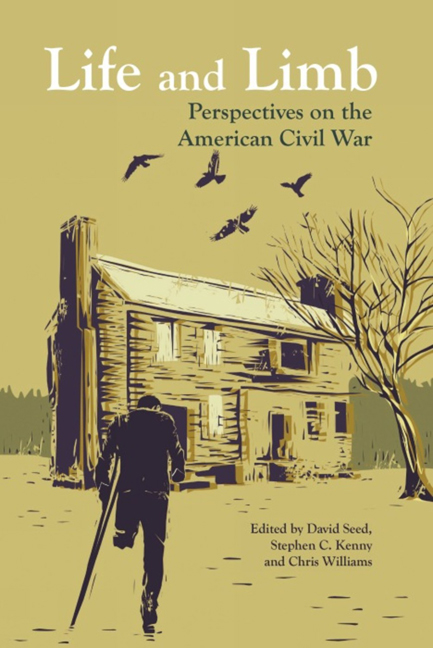Book contents
- Frontmatter
- Contents
- List of Illustrations
- Acknowledgements
- Introduction: Civil War Voices and Views
- MEDICAL AND SURGICAL MEMOIRS
- ACCOUNTS OF NURSING
- MEDICAL FACILITIES AND PATHOLOGY
- PHOTOGRAPHY
- AMPUTATIONS AND PROSTHETIC LIMBS
- IN THE FIELD OF BATTLE
- Diary: October 29, 1862: The Civil War Diary and Letters of Sergeant Henry W. Tisdale
- The Battle of Shiloh: Aftermath: ‘The Battle of Shiloh’ from Annals of the War
- The Battle of Ellyson's Mills: A Confederate Surgeon's Letters to His Wife Spencer Glasgow Welch
- Aftermath of Battle, Cedar Mountain, Virginia: ‘Personal Recollections of the War’
- After the Battle of Winchester: A Virginia Yankee in the Civil War
- The Negro as a Soldier
- Army Life in a Black Regiment
- POST-WAR NARRATIVES
- Contributors
- Select Bibliography
- Index
- Plates
Aftermath of Battle, Cedar Mountain, Virginia: ‘Personal Recollections of the War’
from IN THE FIELD OF BATTLE
- Frontmatter
- Contents
- List of Illustrations
- Acknowledgements
- Introduction: Civil War Voices and Views
- MEDICAL AND SURGICAL MEMOIRS
- ACCOUNTS OF NURSING
- MEDICAL FACILITIES AND PATHOLOGY
- PHOTOGRAPHY
- AMPUTATIONS AND PROSTHETIC LIMBS
- IN THE FIELD OF BATTLE
- Diary: October 29, 1862: The Civil War Diary and Letters of Sergeant Henry W. Tisdale
- The Battle of Shiloh: Aftermath: ‘The Battle of Shiloh’ from Annals of the War
- The Battle of Ellyson's Mills: A Confederate Surgeon's Letters to His Wife Spencer Glasgow Welch
- Aftermath of Battle, Cedar Mountain, Virginia: ‘Personal Recollections of the War’
- After the Battle of Winchester: A Virginia Yankee in the Civil War
- The Negro as a Soldier
- Army Life in a Black Regiment
- POST-WAR NARRATIVES
- Contributors
- Select Bibliography
- Index
- Plates
Summary
David Hunter Strother (1816–1888) was an American author and magazine illustrator, published under the pen-name of ‘Porte Crayon,’ i.e. ‘Pencil Carrier,’ probably a homage to Washington Irving's pen-name of Geoffrey Crayon. From 1866 to 1868 he published a series of eleven sketches in Harper's Monthly under the title ‘Personal Recollections of the War.’ He joined the Union army as a topographer, rising in the ranks to brigadier-general.
In his opening sketch (June 1866) he records how the war initially struck him as the ‘rage of adverse dogmatisms,’ but then came to realize the large issues of freedom at stake. Of his ‘Personal Recollections’ he states: ‘It will be seen that in writing these individual experiences it is not proposed to emulate the dignity and comprehensiveness of History, but to give closer and more detailed views of characters and events, a series of photographic pictures hastily caught during the action of the changing drama.’ His attention to visual specifics comes out clearly in the excerpts above, which serve as a reminder that not all the fatalities in the war were human.
The following excerpt is from Strother's ‘Personal Recollections of the War: Eighth Paper,’ Harper's New Monthly Magazine 35 (June– November 1867), pp. 273–95.
I was sent forward with an order to hasten Buford's advance. Having delivered my message I took the opportunity of riding over the late battlefield. On the spot where the evening's advance fell upon the Staff on Saturday night, afterward occupied by one of their batteries, I saw fourteen dead bodies of horses, swelled and corrupting, in close contiguity. There were also four dead bodies of artillerists, supposed to be a captain, a lieutenant, and two privates. There were altogether twenty-seven horses lying in the vicinity, and the field and road were stained with blood and covered with scattered hats, equipments, broken wheels, and vehicles. The wood behind was terribly shattered by our artillery fire, not among the tree-tops, as is usually the case; but all our missiles seem to have struck near the ground, with an accuracy fatal to any body of infantry which may have occupied the wood as a support for the artillery.
- Type
- Chapter
- Information
- Life and LimbPerspectives on the American Civil War, pp. 157 - 158Publisher: Liverpool University PressPrint publication year: 2015



